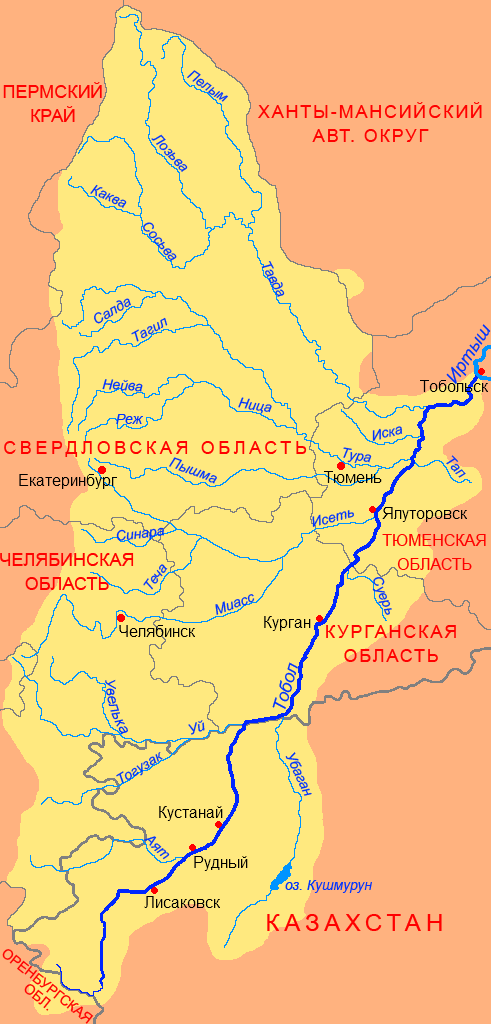Techa River on:
[Wikipedia]
[Google]
[Amazon]
 The Techa (, ) is an eastward river on the eastern flank of the southern
The Techa (, ) is an eastward river on the eastern flank of the southern
Techa River
dumped an estimated of
/ref> a cumulative dispersal of of radioactivity. As many as forty villages, with a combined population of about 28,000 residents, lined the river at the time. For 24 of them, the Techa was a major source of water; 23 of them were eventually evacuated. In the past 45 years, about half a million people in the region have been irradiated in one or more of the incidents, exposing them to as much as 20 times the radiation suffered by the
 The Techa (, ) is an eastward river on the eastern flank of the southern
The Techa (, ) is an eastward river on the eastern flank of the southern Ural Mountains
The Ural Mountains ( ),; , ; , or simply the Urals, are a mountain range in Eurasia that runs north–south mostly through Russia, from the coast of the Arctic Ocean to the river Ural (river), Ural and northwestern Kazakhstan.
noted for its nuclear contamination. It is long, and its basin covers . It begins by the once-secret nuclear processing town of Ozyorsk about northwest of Chelyabinsk
Chelyabinsk; , is the administrative center and largest types of inhabited localities in Russia, city of Chelyabinsk Oblast, Russia. It is the List of cities and towns in Russia by population, seventh-largest city in Russia, with a population ...
and flows east then northeast to the small town of Dalmatovo to flow into the mid-part of the Iset, a tributary of the Tobol
The Tobol (, ) is a river in Western Siberia (in Kazakhstan and Russia) and the main (left) tributary of the Irtysh. Its length is , and the area of its drainage basin is .
History
The Tobol River was one of the four important rivers of the S ...
. Its basin is close to and north of the Miass, longer than these rivers apart from the Tobol.
Water pollution
From 1949 to 1956 theMayak
The Mayak Production Association (, , from 'lighthouse') is one of the largest nuclear facilities in the Russian Federation, housing Production reactor, production reactors (''non'' electricity) and a reprocessing plant. The closest settlement ...
complexdumped an estimated of
radioactive waste
Radioactive waste is a type of hazardous waste that contains radioactive material. It is a result of many activities, including nuclear medicine, nuclear research, nuclear power generation, nuclear decommissioning, rare-earth mining, and nuclear ...
water into the Techa River,CHELYABINSK "The Most Contaminated Spot on the Planet" – a documentary film by Slawomir Grunberg – Log In Productions – distributed by LogTV LTD/ref> a cumulative dispersal of of radioactivity. As many as forty villages, with a combined population of about 28,000 residents, lined the river at the time. For 24 of them, the Techa was a major source of water; 23 of them were eventually evacuated. In the past 45 years, about half a million people in the region have been irradiated in one or more of the incidents, exposing them to as much as 20 times the radiation suffered by the
Chernobyl disaster
On 26 April 1986, the no. 4 reactor of the Chernobyl Nuclear Power Plant, located near Pripyat, Ukrainian Soviet Socialist Republic, Ukrainian SSR, Soviet Union (now Ukraine), exploded. With dozens of direct casualties, it is one of only ...
victims.
The Tobol is a sub-tributary of the Ob, being linked by the final part of the Irtysh
The Irtysh is a river in Russia, China, and Kazakhstan. It is the chief tributary of the Ob (river), Ob and is also the longest tributary in the world.
The river's source lies in the Altai Mountains, Mongolian Altai in Dzungaria (the northern p ...
; all three flow generally north.
See also
* Pollution of Lake Karachay * List of most-polluted rivers *Water pollution
Water pollution (or aquatic pollution) is the contamination of Body of water, water bodies, with a negative impact on their uses. It is usually a result of human activities. Water bodies include lakes, rivers, oceans, aquifers, reservoirs and ...
* Plutopia
''Plutopia: Nuclear Families, Atomic Cities, and the Great Soviet and American Plutonium Disasters'' is a 2013 book by American environmental historian Kate Brown (professor), Kate Brown. The book is a comparative history of the cities of Richlan ...
* Ozyorsk, Chelyabinsk Oblast
* Semipalatinsk Test Site
References
{{Authority control Rivers of Chelyabinsk Oblast Rivers of Kurgan Oblast Nuclear accidents and incidents Water pollution in Russia Disasters in the Soviet Union Radioactive waste Waste disposal incidents 1949 disasters in the Soviet Union 1956 disasters in the Soviet Union 1940s disasters in the Soviet Union 1950s disasters in the Soviet Union